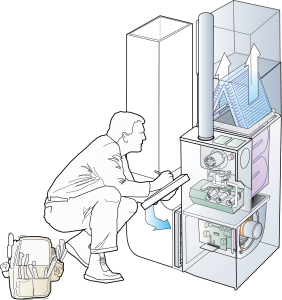
Over the years, I’ve had many discussions with engineers about the accuracy of technicians who do HVAC system field testing. It is clear this subject is on the minds of many industry leaders. In fact, as many groups look to the future, decisions are being made based on their opinions that field personnel can test and diagnose HVAC systems. So let’s take a look at the thinking being discussed.
Groups wrestling with this question include equipment and control manufacturers, standards and industry trade organizations, facility maintenance organizations, utilities, and government. Moreover, this is the primary question they ask is: “Will the folks in the field step up their skills to match the new technology and tools we send to the market?”
Technician Field Testing Pros
In these conversations, you, the field technician, have many champions sharing their assurance that you have what it takes to meet these challenges.

On the other hand he said most utility programs in his marketplace spend nearly all their training funds teaching technicians how to fill out rebate forms. Many spend
He then described how he saw technicians being trained to test, diagnose, repair, and verify improvement in system performance. Furthermore, real measurable increases were documented. The difference, he said, were programs of the past only assumed the work was completed in a satisfactory manner.
Finally, he gives much of the credit to technicians mastering skills using new and affordable HVAC test instruments. He feels this results in increased speed and accuracy of the testing. I couldn’t agree more.
Other Supporting Evidence
In addition, manufacturers commented on how a segment of the industry seems to be pulling away from the pack of traditional contractors. As a contractor’s abilities to test, diagnose, and prescribe solutions increase, the manufacturers say they are tracking warranty cost reductions up to 75% compared to the average dealer.
Finally, there is a segment of our industry called Energy Measurement and Verification (EM&V) professionals. They are field measurement experts who verify and document the work and accuracy of HVAC professionals on installed systems in the field.
Surprisingly, this group expressed a hope that one day soon, HVAC contractors, technicians, and EM&V professionals will each test using the same procedures and calculation methods to verify installed HVAC system performance. One member of the EM&V group shared a story about what he had recently learned from field technicians. This is a huge shift in this community’s culture compared to just six years ago.
Technician Field Testing Cons
Most of the negative comments about HVAC technician field testing accuracy came from those who claim such testing is only credible in a laboratory setting. In fact, several individuals see field testing as coarse and raw. They consider HVAC technicians incapable of accurate measurements.
In truth, most of this community has little or no interaction with HVAC professionals in the field. Many tell me they
Given their experience, this opinion is convenient. A closer look at these studies reveal the methods used to evaluate technicians’ field testing abilities followed a dissimilar set of testing protocols using different test instruments. To put it another way, how could this ever stand up under scientific scrutiny?
Industry Literature Findings

Many studies and papers discuss the accuracy of field testing. For example, one study discussed how control system accuracy is entirely dependent on sensor placement in the system. The same is true of field testing.
For example, a technician’s ability to measure accurately depends on several variables:
- Choice and application of test instruments
- Selection of proper test locations
- Use of appropriate test procedures for the test
- Recording and interpreting test results.
In conclusion, very few of these industry studies and papers considered the above-mentioned factors. An informal study of trained and certified field technicians using live in-field quality assurance and verification concluded the following increases
| Trained and Certified HVAC Technician Field Testing Accuracy | |
| Electrical Power | ±3% |
| HVAC System Air Pressure | ±5% |
| Equipment Air Temperatures | ±2% |
| HVAC System Enthalpy | ±4% |
| Air Volume at the fan | ±8% |
| Air Volume at grilles | ±8% |
| Outside air volume | ±12% |
| Air Density | ±5% |
| Interpretation of manufacturer capacity and airflow data | ±10% |
| Fan Speed | ±7% |
| HVAC System Delivered Capacity | ±10 |
Rate Your Testing Ability
So the real question is, how do you rate your ability to accurately test the HVAC systems you sell, install, and service? Are you a student of your profession? Do you seek to improve yourself and increase your ability to serve customers? If you do, welcome to the small, but growing segment of professionals who are raising the bar in the HVAC contracting universe. You ARE well ahead of the pack and can be assured you live with purpose and satisfaction in your work.
Rob “Doc” Falke serves the industry as president of National Comfort Institute, Inc. (NCI), an HVAC-based training company and membership organization. If you’re an HVAC contractor or technician interested in a free test procedure describing simple testing you can do on a sales visit, contact Doc at robf@ncihvac.com or call him at 800-633-7058. Go to NCI’s website at nationalcomfortinstitute.com for free information, articles, and downloads. And visit the HVACToday.com website for the latest on Performance-Based Contracting™.